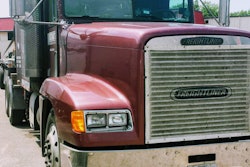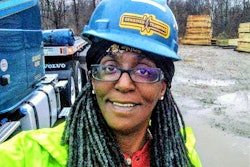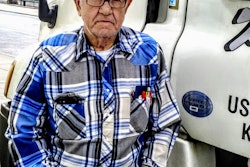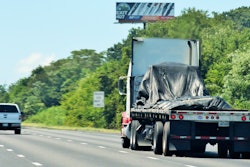As we hit the one-year anniversary of the implementation of the ELD mandate, a conversation with a father who stayed in the industry, and a son who got out.
Milkman , a.k.a. Bill Wilker
Occupation: Trucker
Past jobs: Farmer, drywaller, bicycle maker
Milkman Junior, a.k.a. Lee Wilker
Occupation: Farm Manager
Past jobs: Trucker, soldier, farmhand, construction worker
Remember all those drivers who swore if someone ever put an e-log in their truck that would be their last day on the job? Many even made dramatic exits on Facebook, pronouncing a pox upon the FMCSA and all those “lily-livered steering wheel holders who didn’t have the guts to shut down.” Most are back, if they ever left. No judging, here. So help me, I’ve sworn I would leave this racket many a time, and here I am, nosed up to a barren field at the Jeffersonville, Ohio, Flying J on a Saturday night, too jacked up on caffeine to sleep, pecking away at an Android tablet at 1:49 a.m.
“Dude, I detest you.”
I did, however, unearth one hardcore gearjammer, a trucker’s son in fact, who, as the mandate approached, quietly got out (no Facebook account, thank you very much), stayed out, and never came back. If you knew Lee Wilker like I did back in the day, you would know what a “man bites dog” story this really is. With ten years of trucking under his belt, not including a couple hiatuses for Uncle Sam, driving truck was all Milkman Junior ever wanted to do. The son of longtime milk hauler Bill Wilker (CB handle: Milkman) — who, for his part, was recently recognized by the National Association of Small Trucking Companies as part of their ‘America’s Best Drivers’ Team’ for an over the road career which exceeded an astounding 3,300,000 miles without a chargeable accident — young Lee was one of those rural Midwestern kids who grew up on his dad’s truck. He started his own career earlier than most, running a farm milk route at 21. After an eight-year stint that followed with a reefer outfit in Ohio, Lee wound up running ag freight for a small carrier in a decked-out 2015 W900L, a Fitzgerald glider kit with a 12.7 Detroit, 3:55 rears and a 13 over.

The first thing that came out of my mouth when I saw that tricked-out silver-grey beauty was “Dude, I detest you.” He had gotten everything he wanted; it really was one of the sweetest working trucks on the road. The motor was even ELD-exempt, so why the exodus? For Milkman Junior there were several factors, including the changes he saw coming out here, namely the loss of courtesy and professionalism.
A recent trip to Parris Island in S.C. to see a cousin graduate from basic training was stark confirmation he had made the right decision. His first trip to the Southeast in a year, Lee was shocked at just how much the industry had changed. “It was like the difference between night and day. I mean, I’m going down I-40 late at night, and there were hardly any trucks on on the road; everyone was piled into the truck stops, rest areas and on-ramps.”
As he made his way to his favorite diner for a sit-down meal, he felt he was seeing a decline in drivers’ personal appearance: “I sat in there an hour and a half before seeing someone walk in with with a nice pair of jeans and a clean shirt.” The clincher, though, was the difference in the way truckers drive: “You had guys rushing to the front of the of the line in construction zones, just like the four-wheelers. There was a time when idiots like that would have been drug out of their trucks and had the hell beaten out of them.”
Indeed, the recent rash of trucker-involved shootings are making the days of CB quarrels turned roadside fisticuffs almost idyllic by comparison. In the last several weeks alone, shootings have occurred in Florida, Georgia, Alabama, Texas and Tennessee, some during altercations over parking spots or at the fuel island, some during road rage incidents.
It would be interesting to know the extent to which a beat-the-clock mentality, reinforced by lockdown hours enforcement, had been a factor in any of the cases, if at all. As to the racing in construction zones, it would stand to reason that the same desperation that causes a man to smash out another driver’s window with a thermos because he’s taking up two parking spaces at the Wildwood TA might well lead someone else to try to muscle ahead to the front of the line in an upcoming lane closure situation, his fellow driver be damned. When time is no longer something that can be controlled, the battle over space becomes inevitable.
As to the decline in personal appearance, a conversation that I keep having with other drivers I’ve known a long time is just how dog-gone hard it is to negotiate something as simple as a truck stop shower in the e-log era. A friend who once showered nearly every day confided he is now going two to three days without one.
“Don’t be scared to ask questions.”
When I caught up with Milkman Senior by phone, he was sitting by his wood burner on a cold November night, resting up from another load of moo-juice safely delivered. Despite living in a beautifully refurbished country home, the cast iron stove remains his preferred heat source. “I like it. The boys think it’s too hot in here, but they don’t live here anymore,” he laughs. Yes, he has noticed changes in the e-log age as well, but with a little different perspective. In a trucking career during which he has worked for just three carriers in more than 40 years, the 64-year-old regional milk hauler for Moeller Trucking is simply too close to the finish line to give up now.
“I’m hanging it up in February,” he says. His wife, Marlene, “would like to have me around a little more. I might still drive part-time, depending on the load.”
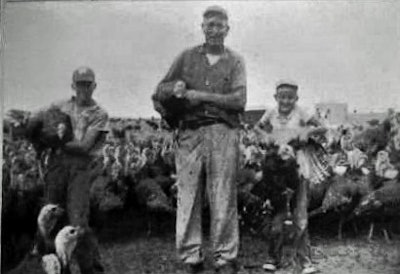 Bill Wilker, left, with his grandfather and brother Marty. As Bill puts it, “I said I would never stay on the farm. I still can’t figure out how to leave.”
Bill Wilker, left, with his grandfather and brother Marty. As Bill puts it, “I said I would never stay on the farm. I still can’t figure out how to leave.”Before he had all those safe miles under his belt, but of course, Milkman Senior started driving an outfit that bended in the middle at the ripe old age of eight. It was a Farmall M with a hay wagon on Route 219 down the five-mile stretch between his father and grandfather’s land near Montezuma, Ohio. By nine, he was cultivating corn with his grandpa’s Allis Chalmers WD45.
“Folks would slow down to look at my brothers and me working those fields,” he says. “Sometimes there’d be four of us out there.”
After high school, he went on to make bicycles for Huffy in Celina for about five and a half years, then took up with Brookside Trucking in 1978, while hauling livestock for Tuente Trucking on the side. “Those three outfits were all in a five-mile radius of my house. They all treated me very well,” he says.
But in 1998, he went to work with Moeller Trucking and never looked back, running the farm milk route for eight and a half years before going to the milk transfer side in 2007. Still, like his son, Milkman sees changes that he finds troubling in the e-log era. “Truckers don’t talk to each other anymore,” he says. “It’s just fun doing that. A while back I stopped at the Flying J near the Wisconsin line on I-90 in Illinois and got to talking to a couple fellas a few stools away. We talked for an hour and a half, just like the old days.” A rare occurrence.
More often that not, he adds, “Nowadays, you speak to someone, and they just walk right past you.” Where Milkman Junior sees the erosion of professional standards, the brunt of the impact for Senior is the evaporation of that certain fraternity that drivers once had with each other. As recently as two years ago, author and owner-operator Finn Murphy wrote in his book “The Long Haul: A Trucker’s Tales of Life on the Road” about the unique tendency that truckers had to speak at length among themselves without any previous introduction. So much of that is gone, now.
“It’s taken a social life that was already pretty bad, and made it unbearably bad,” Milkman Junior observed. For his part, though, there was another reason for Milkman Junior to get out — the birth of a son, and his desire to not place the entire burden of raising a child on his wife.
The decision received his father’s hearty blessing: “Why do you think I ran that dump truck and farm route all those years?” he says, laughed. I asked Milkman Senior if there was any advice he might have for anyone starting out. This one works for anyone:
Milkman’s Number One Rule: “Don’t be scared to ask questions. Too many think they know it all. Hell, I’m still learning stuff today. Most of the time, the other drivers will be glad to help you.”
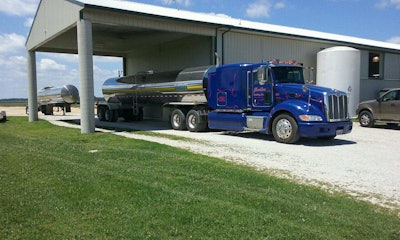 Milkman’s old 386 Pete, leaving the farm with another load of moo-juice.
Milkman’s old 386 Pete, leaving the farm with another load of moo-juice.More from Long Haul Paul’s “Faces of the Road” series

